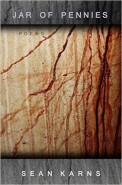
Book Review: Jar of Pennies by Sean Karns

Jar of Pennies
Poems by Sean Karns
New American Press, June 2015
ISBN-13: 978-1941561034
$14.95; 69 pp.
Reviewed by Amanda Hemmingsen
Sean Karns characterizes the metallic scent of pennies in the first of five sections that comprise Jar of Pennies: “The year my mother worked / the slaughterhouse, / she came home smelling of blood: a jar of pennies smell” (“Jar of Pennies”). These themes waft through the rest of the collection. The scent of iron is the scent of blood—familial blood, the blood of domestic and national violence, the blood of death. And yet, a jar of pennies is a symbol of childhood dreams and determination, “I listened to her sobs; I rattled my jar” (”Jar of Pennies II”). For all their small spending power, pennies somehow retain the strength of childhood imagination and the potential of inexperience as a son grapples with suffering. So, too, does Karns’s poetry function, as both an unavoidable odor of open cuts and a careful collecting of slivers of precious moments.
Karns succeeds at the alchemical process of distilling the self out of memory, letting readers step into these experiences. The young American son of the Midwest is witness to the violence endemic in the lives of his parents—unemployment, divorce, lying, abuse, the suffering of slaughterhouses, and broken dreams. Along with the self of his childhood, Karns evokes for readers the self of a nation with an ideal of peace as well as the self divided, caught in the turmoil of the heartache of love. That love calls us to be like and yet more than our parents, and internal conflict arises when we have parents who lie, who drink, and who allow themselves to be violated by others.
This distilling of self and memory is at its best in recollections of childhood. For example, the fourth section is a carefully arranged accumulation of the small moments of building a tire swing as the solitary act of a child trying to build himself a childhood and a connection to family that soars above the pain:
He peeks out of the hollow
of the oak tree. He slips
on the dewy ground.
And later in the poem, when he is deep in the nearby forest:
[ ]. He throws
the rope over a tree limb,
dollies up his scarf, hatchet
and hammer. There’s no
higher place for him
to throw his rope.
The other slices of life that come under the poet’s gaze never quite come close to holding the same intensity as those of childhood. The section on an affair strives for that same objective yet intensely emotional view, yet the emotion feels somewhat stifled. Karns is clearly trying to reach for that same space of telling only one’s story, but the silent resonances in the empty space around the words does not quite have the same powerful impact as the poems on family and childhood.
Karns tends to favor short simple lines, with the emotional weight hovering in the gaps between lines and stanzas. Within that, though, exists a wide range of stylistic stanzaic and line break choices, as well as a clear continuity of voice and no sense of artificiality to the range. The form fits the content. The strength of the story that rises in the space between what was said and what was evoked is its best when left with room to breath, such as in “The Boy Sitting at the Piano:”
the wall—ghostly. He sits
at his piano, head bowed
like prayer and plays the hallowed
piano, composing battered
music for the out-of-reach
world—the factories
Karns knows how to take “comfortable” narratives and give them their power through accurate, intimate detail. The honesty with which Karns speaks from the depth of himself possesses all the hefty weight of a jar of pennies in a toddler’s hands.
Amanda Hemmingsen, a Kansas native, has been consuming and creating poetry for quite some time now. Currently serving as the Poetry Editor for Ad Astra.
